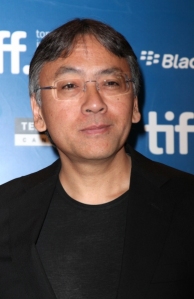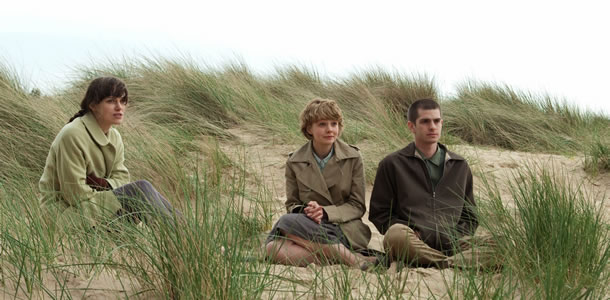(Update Oct. 5, 2017: Kazuo Ishiguro has just won the Nobel Prize for Literature)

I must first declare this Spoiler Alert: It is impossible to write about the book and the movie clearly without stating the crux of the story. It is this key ingredient in the plot that instills meaning to the novel and now the film. While Never Let Me Go is a story of slow revealing, author Kazuo Ishiguro, in a Time magazine interview, admits that:
” … in a funny sort of way, I almost wanted the mystery aspect to be taken away so that people could conentrate on other aspects of the book.”
So there, even the author himself condones spoilers, for he knows there are much more to be pondered upon once the veil is removed.
Never Let Me Go (2005): The Book
Born in Nagasaki, Japan, in 1954, Kazuo Ishiguro‘s family moved to England when he was six. He is one of the most acclaimed English language writers today, listed by The Times as one of the 50 greatest British writers since 1945. Never Let Me Go is Ishiguro’s fourth nomination short-listed for the Booker Prize, which he won in 1989 with The Remains of the Day.

Based on a scientific premise, Never Let Me Go is a beautiful love story told with aching poignancy. Children of the exclusive boarding school Hailsham are told they are special from a very young age. They are to keep their bodies healthy and strong for that’s the purpose of their lives. They are told and yet not told, for theirs is a vague notion of who they really are or what is in store for them in the future. Knowing no other worlds, the children grow up in the sheltered, fenced-in compound of Hailsham, accepting their predetermined fate with docility.
Scientific advancement has made it possible. The children of Hailsham are clones, copied from an original, raised to have their organs harvested once they reach the prime stage of adulthood. While sports keep their bodies strong, they are particularly encouraged to pursue art and poetry. A mysterious figure they called Madame comes by regularly to collect their art work to keep in her Gallery.
The story focuses on three students, Kathy, Ruth, and Tommy. Their friendship on the outset matches the idyllic backdrop of the school in the 1960’s English countryside. Kathy is kind, caring and gentle, always watching out for Tommy, who is inept and temperamental. Seeing the bond forming between the two, Ruth slyly moves in and silently snatches Tommy to her side.
After reaching their eighteenth year, the three are transferred to the Cottages to live. There are just two roads ahead of them, donation of their organs and after 3 or 4 times, meets completion, death. Or they could apply to become carers of donors, but only temporarily until they too must fulfill their purpose. Living with other grown-ups who fall into the same destiny, the undercurrents of their love triangle begin to expose. For the first time in their lives, they hear about ‘deferrals’. If genuine love is evident between a couple, they could apply to have their donations deferred for a few years. When you are in love, just another day is precious enough. But what is love, and how do you prove it? There might also be another way out, and art could be the key. Ishiguro has masterfully handled layers of thematic complexity in a shroud of suspense.
While the story is based on an imaginary scientific scenario, the book is not a debate on the medical ethics of cloning. The events that take place which ultimately lead to their determined end explore, ironically, what it means to be human. Using the intricate relationships of the threesome, Ishiguro goes deep into issues of love and loss, dreams and reality, wrongs and their amends, and the ultimate search for the source of being, the very purpose of existence.
Using a first person narrative from Kathy, now a carer at 31 looking back at her past experiences, Ishiguro presents his story with detailed internal depictions and nuanced dialogues. Kathy’s voice is innocent and gracious, and all the more moving when it comes to the end when the story is fully unfurled. The three friends have since parted after the Cottages, but now after years have gone by, they meet again as carer and donors. On the canvas of imminent destiny, against the overwhelming tone of grey, we see three brisk strokes of colours, three lives, however temporal, serving their purpose, and above all, having tasted what it means to be human.
~ ~ ~ 1/2 Ripples
Never Let Me Go (2010): The Movie
Update Dec. 6: Carey Mulligan won Best Actress for Never Let Me Go at the British Independent Film Awards last night. This is her second BIFA win after An Education.

Directed by Mark Romanek (One Hour Photo, 2002), screenplay by Alex Garland (28 Days Later, 2002), the film was screened at the 2010 Toronto International Film Festival in September, and chosen to open the 54th London Film Festival on October 13th.
The mood is nostalgic, shot in greyish greens and blues, effectively capturing the general atmosphere of the book. When the future looks dim, the best one can do is to look back and savour what has been. Screenwriter Alex Garland has done an admirable job in being loyal to the source material, visualizing the key events and pertinent scenes, bringing to life the haunting memories of Kathy’s, whose narratives are taken straight out of the book.
Corresponding to the novel, the film is structured in three parts. It follows Kathy (Carey Mulligan, An Education, 2009), Ruth (Keira Knightly, Pride & Prejudice, 2005) and Tommy (Andrew Garfield, The Social Network, 2010) through Hailsham in the 1960’s, young adulthood at the Cottages in the 1970’s, and lastly in the 1990’s where we see the final destination of their lives in completion. While the beginning part is the weakest, lacking the depth and details of the book, such a shortfall is compensated by the excellent performances of the three child actors as the young counterparts, Izzy Meikle-Small (Kathy), Charlie Rowe (Tommy) and Ella Purnell (Ruth). The congruence of young Kathy with her adult role played by Mulligan is particularly impressive.
As the story moves along, almost to midpoint, the unfurling of facts and feelings becomes more pronounced, calling forth some intricate and nuanced performance from Mulligan, Garfield, and Knightly. The three actors are the pillars of the production. While the original music by Rachel Portman (Academy Award Best Music, Emma, 1996) is affective and heart-wrenching, and the cinematography by Adam Kimmel (Capote, 2005) captivating, it is the performance of the threesome that makes the film so real and stirring.

Mulligan’s portrayal of Kathy and Garfield’s Tommy are particularly riveting. The hidden love Kathy has been holding for years is given a channel for expression only briefly at the end. All through Mulligan has carried her role with admirable restraint. Garfield’s portrayal of Tommy is achingly real, especially when he ultimately realizes the finality of his fate, the cry in the dark is haunting and powerful. And kudos to Knightly for accepting a role that puts her in a less than glamorous light. Her change at the end too is moving, giving depth to the exploration of what makes one human… other than love, there is also the courage to admit wrong, seek forgiveness, and the attempt to make amends.
Is it melodramatic or is it evoking deep emotions? Within context here, emotional sentiments or even a few tears at the end of the film might well be a healthy response, nothing to shy away from. Should the scenario arise some day in the future when we need to prove that we are human, and that we have a soul, what better ways to demonstrate but by our capacity to emote love, empathy, compassion, pathos, and the fear of facing such a scenario. May this all remain as science fiction for our enlightenment only.
~ ~ ~ 1/2 Ripples
***
To read other Book Into Film posts, CLICK HERE.



